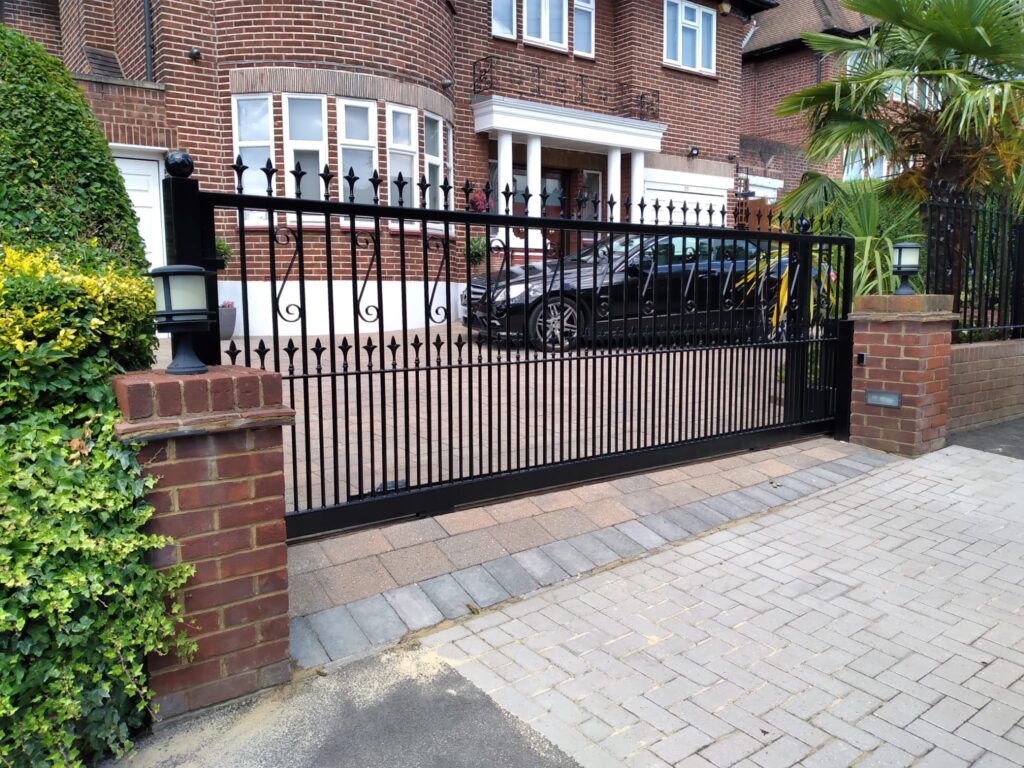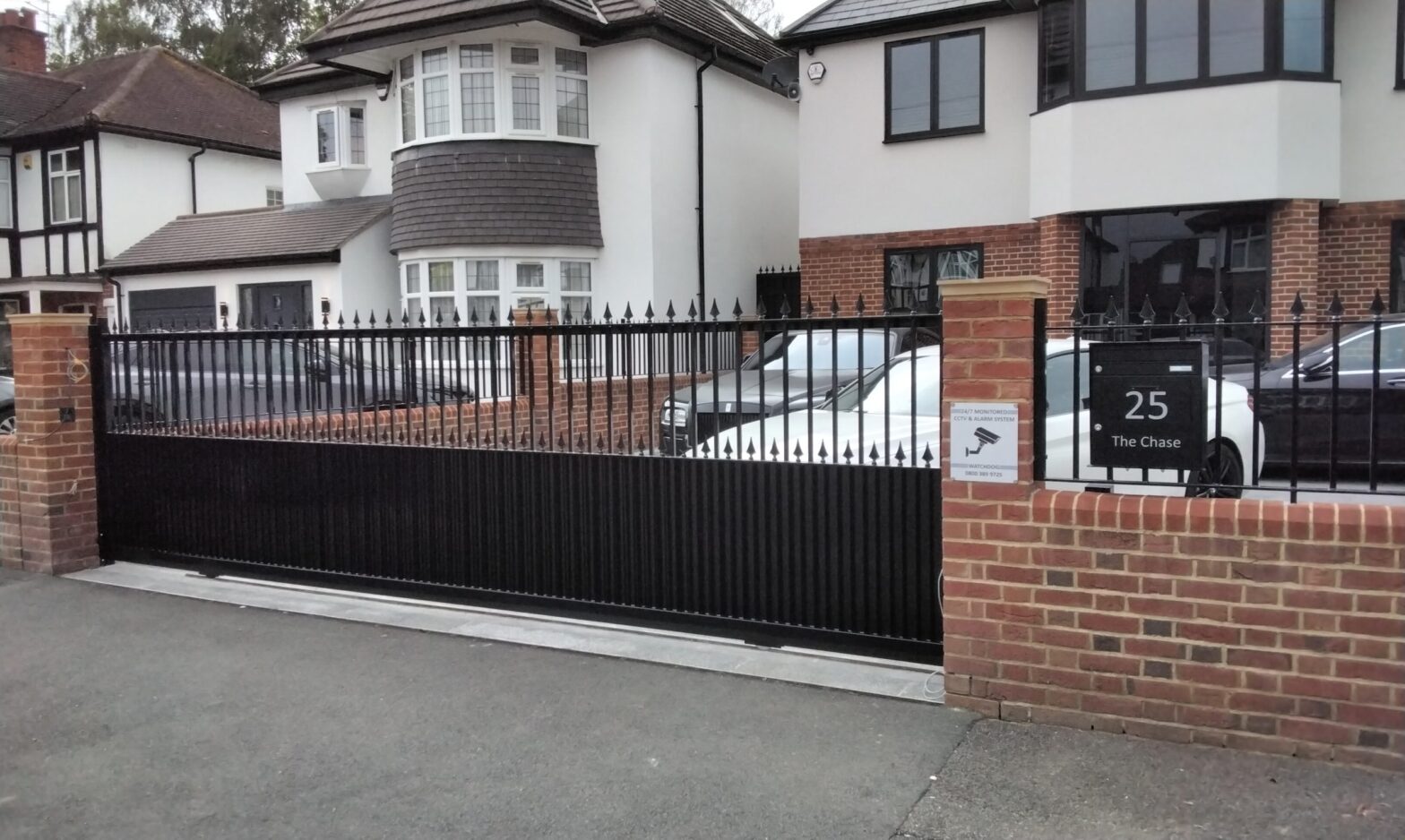
How Long Do Driveway Gates Last? A Guide for UK Homeowners
A well-chosen driveway gate offers more than just aesthetic appeal – it delivers privacy, security, and a great first impression for your home. In many UK households, driveway gates serve as both a visual statement and a vital safety feature. But whether you’ve opted for a sleek aluminium gate, a classic wooden gate, or ornate wrought iron, one pressing question remains: How long do driveway gates last?
Understanding the typical lifespan of various gate materials can help you make an informed investment. After all, your gate is exposed to the full range of the British weather – and a gate that isn’t built to last can become a costly inconvenience. From proper installation to consistent maintenance, a number of factors influence how long your gate will remain functional and looking great.
How Long Do Driveway Gates Last?
Driveway gates are designed to provide long-lasting protection and kerb appeal, but their durability largely depends on several key variables. Whether you’re installing a new gate or maintaining an existing one, knowing what contributes to its longevity is crucial.
What Affects the Lifespan of Driveway Gates?
Several factors influence how long your driveway gate will last:
- Material: The most significant determinant. Some materials last decades with minimal wear, while others require more upkeep.
- Installation: A professionally installed gate is more likely to withstand long-term use and adverse conditions.
- Maintenance: Regular cleaning, oiling of hinges, and repainting or sealing can dramatically extend a gate’s life.
- Weather exposure: Rain, snow, and UV exposure can speed up wear if the gate isn’t built to withstand them.
- Usage frequency: Daily opening and closing increase wear, especially on moving parts like hinges and motors.
Typical Lifespan by Gate Material
Here’s what you can expect from different types of metal gates and other materials commonly used in UK homes:
- Wooden gates: Typically last 10–15 years with proper maintenance. However, untreated timber may deteriorate more quickly due to moisture absorption.
- Wrought iron: Known for its strength, it can last 25–50 years with regular anti-rust treatments.
- Aluminium gates: These gates are rust-resistant and highly durable, often lasting 20–30 years with minimal upkeep.
- Steel gates: Like wrought iron, they offer long-term strength, lasting 20–40 years, but require anti-corrosion coatings.
- Vinyl gates: Low-maintenance and resistant to rot, they can last 20–25 years but may become brittle in extreme cold.
- Composite gates: Combining wood fibres and plastic, they offer the appearance of wood with greater longevity, often 20–30 years.
How the UK Climate Impacts Gate Durability
The UK’s climate poses specific challenges for gate durability:
- Rain and humidity: Wooden gates can warp or rot if not sealed properly, while metal gates risk corrosion without regular treatment.
- Temperature fluctuations: Freeze-thaw cycles can weaken some materials and cause expansion and contraction, impacting gate alignment.
- Wind and storms: High winds put stress on gate hinges and posts. Heavier materials like wrought iron or aluminium gates handle this better.
At Security Gates R Us, we understand the importance of durability, security, and style. We specialise in premium installations that stand the test of time – and the British weather.
Material Comparison: Which Gates Last the Longest?
Choosing the right gate for your driveway or garden isn’t just about curb appeal—it’s an investment in your property’s long-term security and aesthetics. Whether you’re installing wooden gates for a rustic touch or considering metal gates for added durability, it’s essential to understand how different materials perform over time. In the UK, where weather conditions can vary significantly, knowing which gate material stands up best against the elements can save you both time and money in the long run.
Wrought Iron Gates
Lifespan: 70+ Years (with galvanisation and powder coating)
Wrought iron gates are a timeless choice for UK homeowners seeking both elegance and longevity. When treated properly, they can last well over 70 years.
Maintenance: Regular Inspections Required
While robust, these gates require periodic inspections and treatments to prevent rust—especially in coastal or high-moisture areas.
Pros:
- Incredibly durable
- Classic, sophisticated appearance
- Adds significant property value
Cons:
- Can be prone to rust if neglected
- Higher upfront cost due to material and installation
Hardwood Timber Gates
Lifespan: 20–50 Years (with consistent maintenance)
Wooden gates made from hardwoods such as oak or iroko offer a beautiful, natural look ideal for traditional or rural homes. When sealed and cared for properly, these gates can last for decades.
Maintenance: High
Expect to reseal or treat these gates annually to protect them from moisture and insects.
Pros:
- Natural charm that blends into gardens and older properties
- Customisable to fit any size or design
Cons:
- Vulnerable to rot, warping, and pest damage
- Requires regular maintenance
Aluminium Gates
Lifespan: Several Decades
For those seeking a lightweight yet strong option, aluminium gates are becoming increasingly popular. Their corrosion resistance makes them a smart choice for UK homes exposed to moisture.
Maintenance: Low
Little more than occasional cleaning is required, as aluminium doesn’t rust.
Pros:
- Low-maintenance
- Modern look with various finishes
- Lightweight and easy to install
Cons:
- Lacks the traditional character of wooden or iron gates
- May dent more easily than steel
Steel Gates
Lifespan: 15–20 Years
Metal gates made from steel are known for their strength and security. However, their lifespan is generally shorter than wrought iron, especially without regular maintenance.
Maintenance: Moderate
Steel gates need protective coatings and rust prevention treatments to remain in good condition.
Pros:
- Very strong and secure
- Often more affordable than wrought iron
Cons:
- Heavier and harder to install
- Needs frequent upkeep in damp environments
Making the Right Choice for Your Property
Each material has its strengths, and the best choice often depends on your property’s specific needs and aesthetic preferences. If you desire a gate with timeless elegance and unbeatable durability, iron gates—particularly wrought iron gates—are a standout. For a warm, natural look, wooden driveway gates crafted from hardwood may be more suitable, though they demand more attention. Meanwhile, aluminium gates offer a no-fuss, modern solution, and steel gates provide high security with moderate maintenance.
Whether you’re upgrading garden gates or securing a wide entrance, the material you choose will directly impact how long your gate lasts and how much maintenance it will require. By weighing these factors carefully, you can select a gate that not only fits your style but also stands the test of time.
Looking for expert advice or a custom gate solution? Speak to a local gate specialist who can guide you through material choices and ensure your installation matches both your vision and your environment.
A well-maintained driveway gate not only enhances your property’s curb appeal but also ensures security and longevity. Whether you have a sleek metal gate or charming wooden driveway gates, consistent care is essential. Here are practical maintenance tips to keep your gate functioning smoothly for years to come.
Maintenance Tips to Extend Gate Lifespan
Regular Cleaning
Dirt, dust, and debris can accumulate on your gate, leading to potential damage over time. Regular cleaning prevents buildup that can cause rust or wear. For metal gates, use a mild detergent and water to wipe down surfaces, ensuring you dry them thoroughly to prevent moisture-related issues. Wooden driveway gates benefit from gentle cleaning with a wood-safe cleaner to maintain their finish and prevent decay.
Lubrication
Moving parts like hinges, rollers, and tracks require regular lubrication to operate smoothly. Apply a silicone-based lubricant to these components every few months. This reduces friction, prevents squeaking, and minimises wear and tear, extending the life of your gate’s mechanisms.
Inspection
Regular inspections help identify issues before they become major problems. Check for signs of rust, corrosion, or damage to the gate’s structure and hardware. Ensure that bolts and screws are tight, and look for any misalignment or sagging that could affect the gate’s operation.
Professional Servicing
While routine maintenance can be handled personally, scheduling professional servicing annually is advisable, especially for automated gates. Professionals can perform thorough inspections, adjust mechanisms, and address electrical components to ensure optimal performance.
Protective Coatings
Applying protective coatings shields your gate from environmental factors. For metal gates, consider powder coating, which provides a durable, corrosion-resistant finish. Wooden gates benefit from sealants or stains that protect against moisture and UV damage. Regularly reapplying these coatings maintains the gate’s appearance and structural integrity.
Choosing the Right Gate for UK Homes
Climate Considerations
The UK’s diverse weather patterns, including frequent rain and coastal humidity, necessitate gates made from materials resistant to rust and corrosion. Opting for powder-coated aluminium or galvanised steel can ensure longevity and reduce maintenance needs.
Aesthetic Preferences
Your gate should complement your home’s architectural style. Swing gates offer a classic, symmetrical appearance, enhancing traditional properties. In contrast, sliding gates provide a sleek, modern look, ideal for contemporary homes.
Budget Constraints
While initial costs are a consideration, it’s crucial to factor in long-term maintenance and potential value addition. Swing gates generally have lower upfront costs and simpler installation processes. However, sliding gates, though potentially more expensive initially, offer enhanced durability and security, potentially leading to savings over time.
Security Needs
Security is paramount. Sliding gates are often deemed more secure due to their robust construction and resistance to forced entry. Their design makes them harder to breach, providing peace of mind for homeowners.
Automation Compatibility
Modern lifestyles demand convenience. Electric gates, whether swing or sliding, offer automated solutions that can be controlled via remote, keypad, or smartphone apps. This not only enhances security but also adds a layer of sophistication to your property.
Making the Right Choice
Selecting the appropriate gate involves balancing various factors:
- Space Availability: Swing gates require ample space to open inward or outward, making them suitable for properties with larger driveways. Sliding gates, moving horizontally, are ideal for homes with limited front-to-back space.
- Terrain Considerations: For sloped driveways, sliding gates offer smoother operation, as swing gates might face challenges unless special hinges are employed.
- Maintenance: Swing gates, with fewer moving parts, typically demand less maintenance. Sliding gates, especially those with tracks, require regular cleaning to ensure smooth operation.
- Aesthetic Alignment: Consider the visual impact. Swing gates exude traditional charm, while sliding gates offer a contemporary appeal.
Conclusion
Incorporating the right gate enhances not only the security of your UK home but also its aesthetic appeal and value. At Security Gates ‘R’ Us Ltd, we specialise in high-quality solutions tailored to UK homes, including bar grille doors, retractable security gates, driveway gates, railings, and composite gates.
Whether you’re looking for the timeless appeal of swing gates or the space-saving efficiency of a sliding gate, we offer durable, stylish, and automation-compatible options to suit every property. With our professional service and bespoke designs, your gate not only protects but also adds lasting value to your home. Contact our friendly team today on 07401 217 653 or 0208 4322 999 to discuss how our gates offer the perfect balance of security and curb appeal for your property. Let us help you find the right fit.

